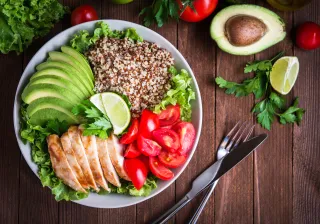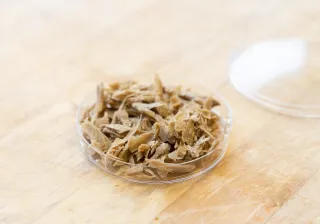Kaisa Poutanen, who has acted over three decades as a Research Professor in the field of food technology at VTT, is one of the most internationally recognised food researchers in Finland. Her research has focused especially on dietary fibre and cereals at the intersection of food technology and nutrition.
– My background in biotechnology has enabled me to study everything from spirits to cereals, from bioethanol to healthy, personalised snacks and from sourdough to gastrointestinal microbiota, says Kaisa Poutanen, who retired from VTT in August.
– Although I have worked at VTT for almost 40 years, the variation in both working environment and research topics made every day an exciting one.
A second career in Kuopio
Poutanen also spent more than 10 years at the beginning of the 21st century working part-time at the University of Eastern Finland – first as the head of the university's Food and Health Research Centre and then as an Academy Professor – which gave her an even wider insight into her field.
– I was during those days also in charge of the European Union's HEALTHGRAIN project, one of the biggest cereal research initiatives in the world. It taught me even more about the diversity of the food system and the knowledge gaps and collaboration needs we have in that respect, she says.
According to Poutanen, the early noughties were the age of when the concept functional food was born. Finland was one of the world leaders in developing functional food products. The health benefits of food are still a popular topic, but EU laws have made it difficult to substantiate health claims.
– One of our missions was to make the digestive system "transparent", in other words, to understand how the origin and processing of food affect the release of nutrients and human metabolism. The scientists in Kuopio are still using metabolomic and nutrigenomic techniques to study nutrition physiology through different kinds of clinical interventions. We already know a lot about why a plant-based diet is so healthy and how its different components affect the body.
VTT and the University of Eastern Finland have also collaborated on a number of dietary behaviour projects.
– Our latest StopDia study focused on understanding how people can be nudged towards healthier lifestyle by modification of their living environment, Poutanen says.
The introduction of new technologies also requires an understanding of human behaviour and the mechanisms of food choice.
A spokesperson for rye and oat
Kaisa Poutanen has worked hard to put rye and oat on the world map.
– I coordinated the Nordic Rye and Health Network, which discovered several new compounds in rye that were interesting from the perspective of health and demonstrated their metabolic and physiological significance. Rye has a key role as wholegrain in the healthy Nordic diet, and its benefits are now recognised on many continents. We have disseminated our results in scientific journals, on websites and at numerous lectures and events, Poutanen explains.
– It has been rewarding to see Nordic research cooperation entering its third decade and being taken up by the next generation of scientists.
Poutanen explains that the first oat fractionation studies at VTT were conducted by Professor Yrjö Mälkki back in the 1980s and that the dietary fibres, starch and protein in oats as well as the processes to make different kinds of food products have now been studied for more than 40 years.
– It is great to see oats finally making a breakthrough as a versatile ingredient, and a massive rise in its consumption. This is an excellent example of the versatility of plant-based ingredients, which will be a big trend in the future.
Poutanen has received some of the international cereal science world's most esteemed awards for her work with cereals, which also earned her an honorary doctorate from the University of Helsinki.
A new era for the food industry
– Three years ago, our team at VTT was working on a strategic roadmap called Food Economy 4.0. Climate change, population growth, urbanisation and ageing all call for new solutions to make food production sustainable in the future. VTT has risen to the challenge by developing technologies that enable the production of new kinds of food ingredients by means of biotechnology and new applications of plant-based fractions.
– In addition to new ingredients, we also need flexible production processes and an increasingly consumer-centric approach. Knowledge is power and also an important product characteristic. Information technology gives consumers a completely new level of control over food and helps individuals to make personalised choices and follow a tailored diet – regardless of where and when they eat. The breadth of VTT's expertise provides a great springboard in this regard.
Semi-retirement
Poutanen continues to work part-time at VTT as Senior Advisor. She also still holds a number of international positions of trust and advisory roles, and continues as a board member of Leipurin Plc.
Poutanen will stay fascinated about food – and of thinking how more and more people could get energy, pleasure and well-being from eating.
– I do also appreciate the luxury of having a slower pace of life and lie-ins in the mornings, taking long walks with my dog and playing with my grandchild in the middle of the week. There is so much to see and do in the world, and it is not really always related to science.




